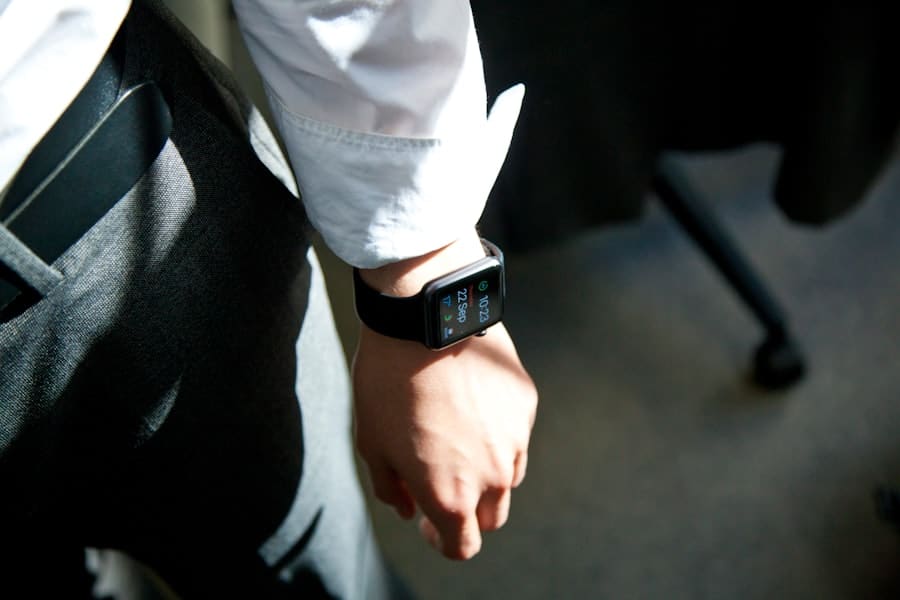The advent of artificial intelligence (AI) has revolutionized numerous sectors, and healthcare is no exception. AI-powered wearables represent a significant leap forward in personal health management, offering real-time data collection and analysis that can transform how individuals monitor their health. These devices, which range from smartwatches to specialized medical sensors, are equipped with advanced algorithms that can interpret vast amounts of data, providing insights that were previously unattainable.
The integration of AI into wearable technology not only enhances the functionality of these devices but also empowers users to take a proactive approach to their health. Wearable technology has evolved from simple fitness trackers to sophisticated health monitoring systems capable of detecting anomalies in vital signs, predicting potential health issues, and even providing personalized recommendations. This evolution is particularly crucial for individuals managing chronic diseases, where continuous monitoring and timely interventions can significantly improve outcomes.
As the global population ages and the prevalence of chronic conditions rises, the demand for innovative solutions like AI-powered wearables is more pressing than ever. These devices not only facilitate better disease management but also foster a culture of health awareness and self-care among users.
Key Takeaways
- AI-powered wearables are revolutionizing the way chronic diseases are managed by providing real-time monitoring and personalized insights.
- AI plays a crucial role in analyzing data from wearables to provide early detection, personalized treatment plans, and predictive insights for chronic disease management.
- The advantages of AI-powered wearables in monitoring chronic diseases include continuous monitoring, early detection of health issues, personalized treatment plans, and improved patient outcomes.
- Challenges and limitations of AI-powered wearables in chronic disease management include data privacy concerns, accuracy of AI algorithms, and accessibility for all patients.
- Case studies have shown successful implementation of AI-powered wearables in chronic disease management, leading to improved patient outcomes and reduced healthcare costs.
The Role of AI in Chronic Disease Management
Early Intervention and Prevention
For instance, machine learning algorithms can analyze data from wearables to identify patterns that may indicate a deterioration in a patient’s condition.
Personalized Feedback and Engagement
Moreover, AI can enhance patient engagement by providing personalized feedback based on individual health data. For example, a wearable device might analyze a diabetic patient’s glucose levels and activity patterns to offer tailored dietary recommendations or exercise plans.
Effective Management and Better Health Outcomes
This level of personalization not only helps patients adhere to their treatment regimens but also fosters a sense of ownership over their health. By leveraging AI, healthcare providers can create more effective management plans that are responsive to the unique needs of each patient, ultimately leading to better health outcomes.
Advantages of AI-Powered Wearables in Monitoring Chronic Diseases

The advantages of AI-powered wearables in chronic disease management are manifold.
Traditional methods of monitoring often rely on periodic check-ups, which can lead to gaps in data and missed opportunities for early intervention.
In contrast, wearables provide real-time insights that allow for immediate adjustments to treatment plans. For instance, a heart failure patient wearing a smart device can receive alerts if their heart rate or blood pressure deviates from normal ranges, prompting timely medical attention. Additionally, AI-powered wearables can enhance the accuracy of health monitoring through advanced analytics.
These devices utilize algorithms that can filter out noise from the data collected, ensuring that the information presented to both patients and healthcare providers is reliable. This accuracy is crucial for chronic disease management, where even minor fluctuations in health metrics can have significant implications. Furthermore, the integration of AI allows for predictive analytics, enabling healthcare professionals to foresee potential complications based on historical data trends and intervene proactively.
Challenges and Limitations of AI-Powered Wearables in Chronic Disease Management
Despite their numerous advantages, AI-powered wearables also face several challenges and limitations that must be addressed for widespread adoption in chronic disease management. One major concern is the accuracy and reliability of the data collected by these devices. While advancements in technology have improved the precision of wearables, discrepancies can still occur due to factors such as user error or environmental influences.
For instance, a smartwatch may misinterpret movement as an increase in heart rate, leading to false alarms that could cause unnecessary anxiety for users. Another significant challenge is the integration of wearable data into existing healthcare systems. Many healthcare providers still rely on traditional methods of record-keeping and may not have the infrastructure in place to effectively utilize data from wearables.
This lack of interoperability can hinder the seamless exchange of information between patients and providers, limiting the potential benefits of AI-powered wearables. Additionally, there is a need for standardized protocols regarding data interpretation and usage to ensure that all stakeholders can derive meaningful insights from the information collected.
Case Studies: Successful Implementation of AI-Powered Wearables in Chronic Disease Management
Several case studies illustrate the successful implementation of AI-powered wearables in managing chronic diseases. One notable example is the use of smart insulin pens combined with mobile applications for diabetes management. These devices track insulin doses and provide real-time feedback on blood glucose levels, allowing patients to make informed decisions about their treatment.
A study conducted by researchers at Stanford University found that patients using these smart pens experienced improved glycemic control compared to those relying solely on traditional methods. Another compelling case involves the use of wearable ECG monitors for patients with atrial fibrillation (AFib). A study published in the Journal of the American College of Cardiology demonstrated that patients using wearable devices capable of detecting irregular heart rhythms were more likely to receive timely interventions than those who did not use such technology.
The ability to continuously monitor heart activity allowed for early detection of AFib episodes, significantly reducing the risk of stroke and other complications associated with this condition.
Ethical and Privacy Considerations in AI-Powered Wearables

As with any technology that collects personal health data, ethical and privacy considerations are paramount when it comes to AI-powered wearables. The sensitive nature of health information necessitates robust security measures to protect against unauthorized access and data breaches. Users must be assured that their personal data is handled with care and used solely for intended purposes.
This concern is particularly relevant given the increasing number of high-profile data breaches in recent years, which have raised alarms about the safety of personal information stored on digital platforms. Moreover, there are ethical implications surrounding consent and data ownership. Users must be fully informed about how their data will be used and have the right to control its dissemination.
This includes understanding whether their information will be shared with third parties or used for research purposes without their explicit consent. Establishing clear guidelines around data usage and ensuring transparency will be essential in fostering trust between users and manufacturers of AI-powered wearables.
Future Developments and Potential of AI-Powered Wearables in Chronic Disease Management
The future of AI-powered wearables in chronic disease management holds immense potential as technology continues to advance. One area poised for growth is the integration of artificial intelligence with telemedicine platforms. As remote healthcare becomes increasingly prevalent, wearables can serve as vital tools for real-time monitoring during virtual consultations.
This integration could enhance patient-provider interactions by providing clinicians with immediate access to relevant health data during appointments. Additionally, advancements in machine learning algorithms will likely lead to even more sophisticated predictive analytics capabilities within wearables. Future devices may be able to not only monitor current health metrics but also predict future health events based on a comprehensive analysis of an individual’s lifestyle, genetics, and environmental factors.
This level of foresight could revolutionize chronic disease management by enabling personalized prevention strategies tailored to each patient’s unique profile.
The Impact and Implications of AI-Powered Wearables on Chronic Disease Management
AI-powered wearables are transforming chronic disease management by providing continuous monitoring, personalized feedback, and predictive analytics that empower patients and healthcare providers alike. While challenges remain regarding data accuracy, integration into healthcare systems, and ethical considerations surrounding privacy, the potential benefits far outweigh these obstacles. As technology continues to evolve, we can expect even greater advancements in wearable devices that will further enhance our ability to manage chronic diseases effectively.
The implications of this technology extend beyond individual health management; they also have the potential to reshape healthcare delivery models entirely. By facilitating proactive care and enabling more informed decision-making, AI-powered wearables could lead to improved health outcomes on a population level while reducing overall healthcare costs. As we move forward into an era where technology plays an increasingly central role in our lives, embracing these innovations will be crucial for advancing public health initiatives and improving quality of life for individuals managing chronic conditions.
In a recent article on enicomp.com, they discuss the best order flow trading software available in the market. This article provides in-depth reviews and analysis of various order flow trading software options, helping traders make informed decisions. The Impact of AI-Powered Wearables on Chronic Disease Management could benefit from understanding how order flow trading software can be utilized in the financial sector to improve decision-making processes. To learn more about the best order flow trading software, check out the article here.
FAQs
What are AI-powered wearables?
AI-powered wearables are devices that use artificial intelligence to collect and analyze data from the wearer’s body. These devices can track various health metrics such as heart rate, activity levels, sleep patterns, and more.
How do AI-powered wearables impact chronic disease management?
AI-powered wearables can provide continuous monitoring of a person’s health, allowing for early detection of changes in health status. This can be particularly beneficial for individuals with chronic diseases, as it allows for proactive management and intervention.
What are some examples of AI-powered wearables used in chronic disease management?
Examples of AI-powered wearables used in chronic disease management include smartwatches with health tracking features, wearable ECG monitors, and glucose monitoring devices for individuals with diabetes.
How do AI-powered wearables improve patient outcomes?
AI-powered wearables can provide real-time data and insights to both patients and healthcare providers, allowing for more personalized and timely interventions. This can lead to better management of chronic diseases and improved patient outcomes.
What are the challenges associated with AI-powered wearables in chronic disease management?
Challenges associated with AI-powered wearables in chronic disease management include data privacy and security concerns, the need for validation and regulation of these devices, and ensuring equitable access for all individuals, including those in underserved communities.

